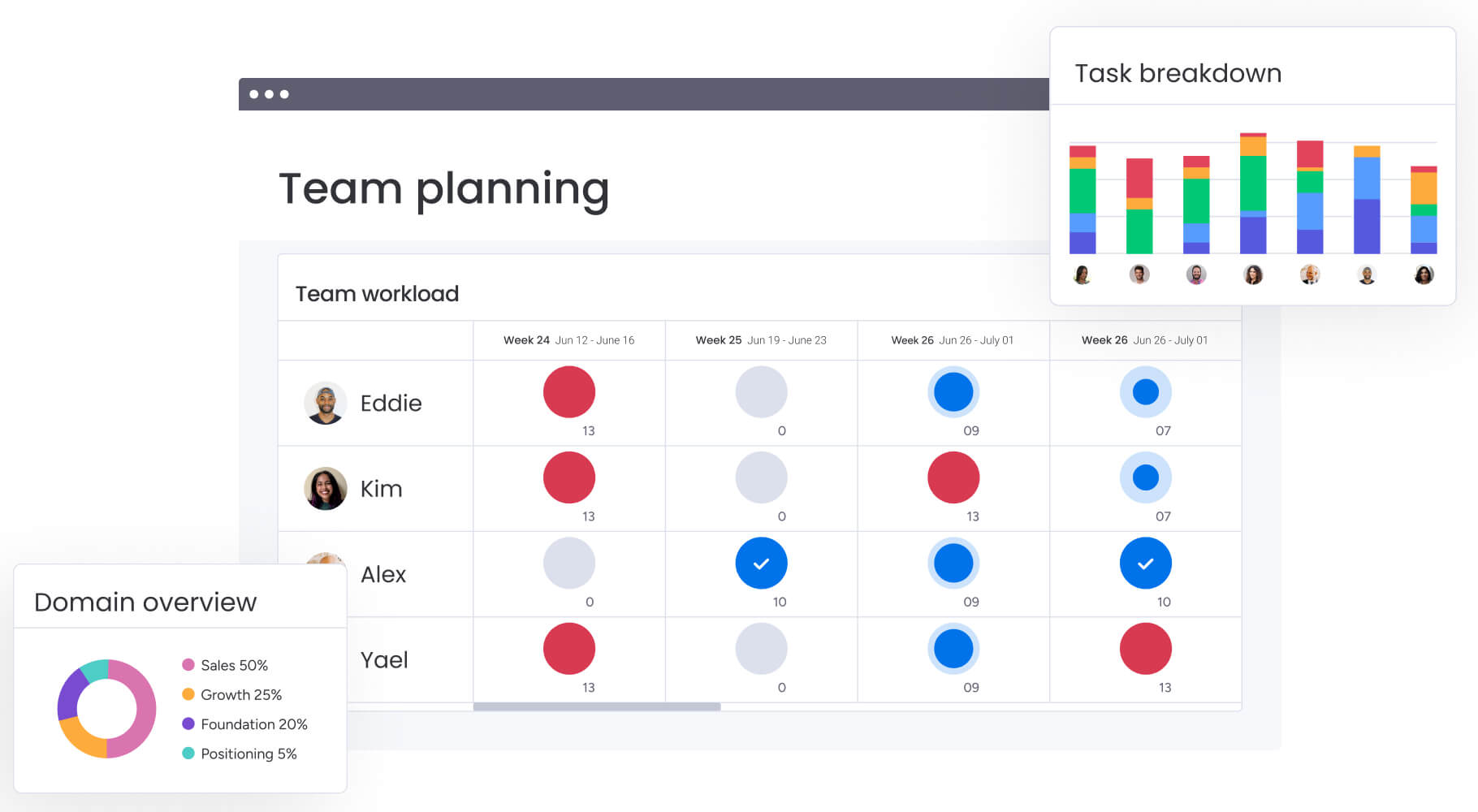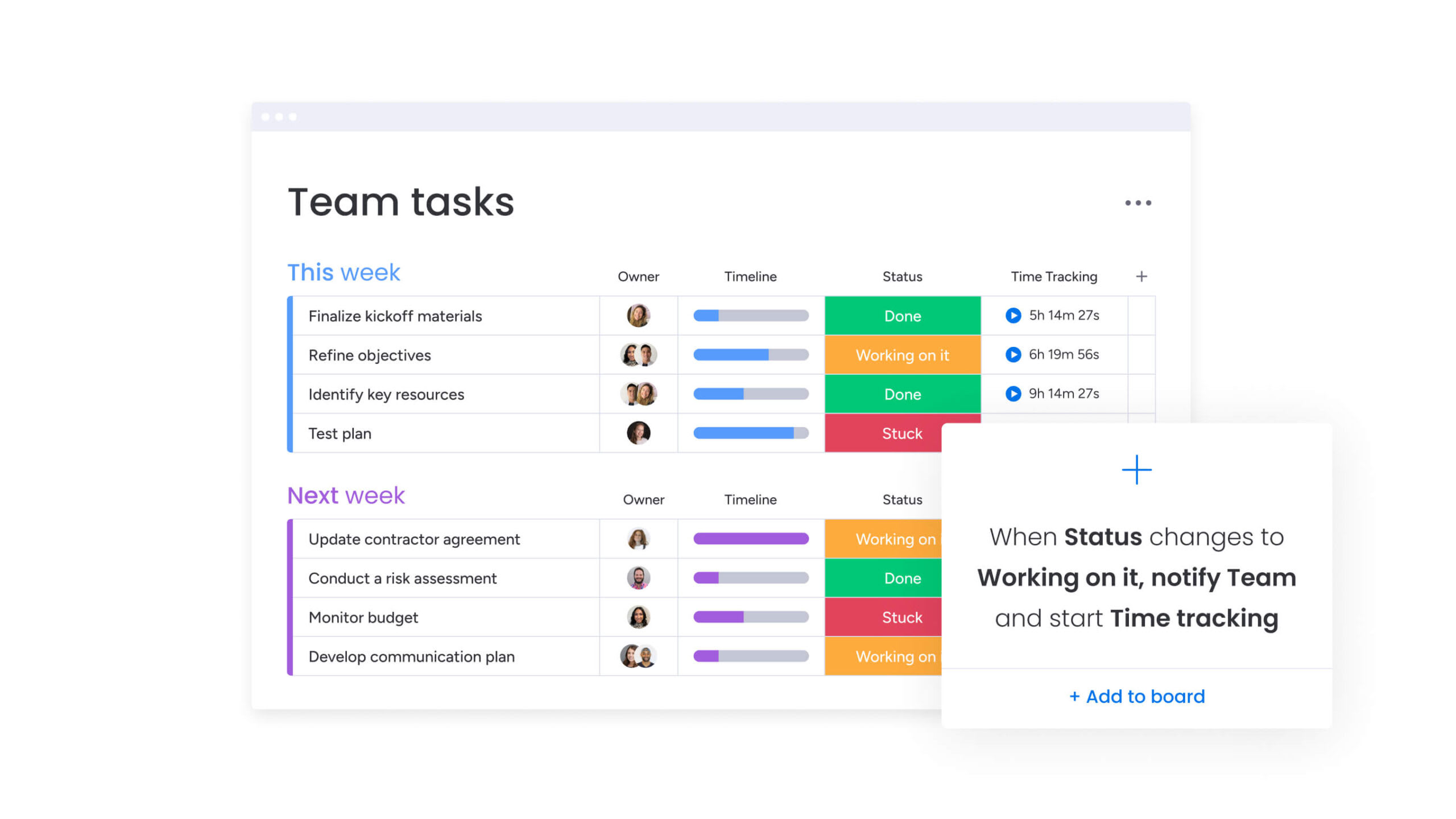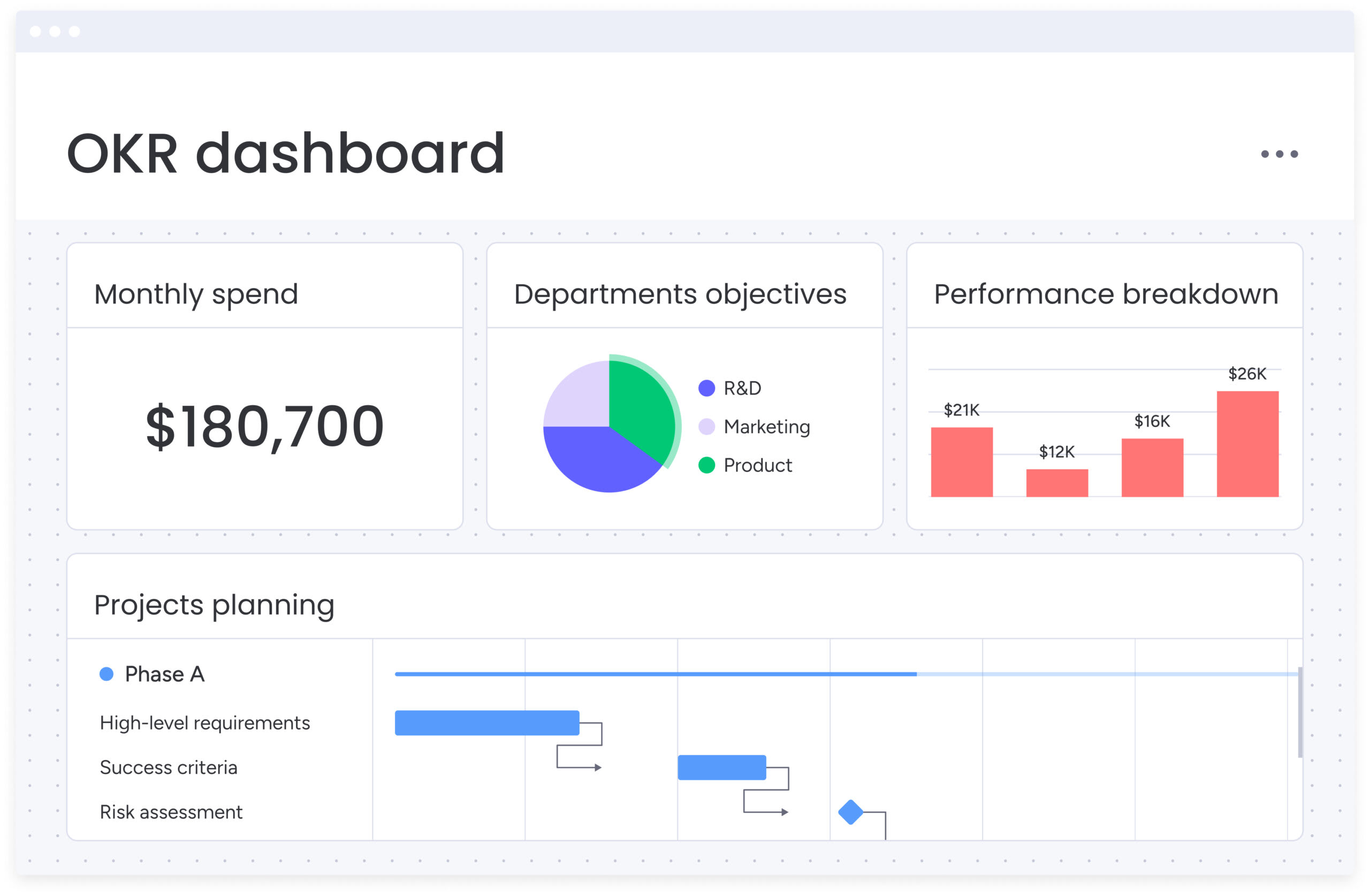Technology initiatives are no longer just a support function — they are the core engine for business growth and transformation. This shift puts immense pressure on teams to deliver complex projects, from cloud migrations to new cybersecurity protocols, that align perfectly with strategic goals.
When work and communication are fragmented across multiple platforms, IT projects quickly lose visibility and control, resulting in scope creep, resource misalignment, and missed deadlines.
This blog will outline a unified approach to IT project management, covering the essential phases, key challenges, examples of modern projects, and tools like monday work management, that enable teams to plan, execute, and monitor technology initiatives from start to finish with measurable impact.
What is IT project management?
IT project management is the process of planning, organizing, and executing technology initiatives to achieve specific business objectives within organizations. This specialized discipline combines traditional project management principles with deep technical knowledge to navigate complex system integrations, software development cycles, and digital transformation requirements.
What is IT project management in practice? It involves coordinating cross-functional teams of developers, system administrators, and business stakeholders to deliver technology solutions that drive measurable organizational outcomes. Information technology project management requires understanding both technical constraints and business priorities to ensure successful project delivery.
Key distinction: IT project management differs from general project management through its focus on technical complexity, rapid technology evolution, and specialized compliance requirements unique to technology environments.
5 core phases of an IT project
Every successful IT project follows a structured lifecycle that transforms business requirements into functional technology solutions. Understanding these phases helps IT project managers navigate complexity while maintaining focus on strategic outcomes.
1. Initiation
The initiation phase establishes project foundations by defining business requirements and assessing technical feasibility. During this stage, it project managers collaborate with stakeholders to develop comprehensive business cases that justify technology investments and outline expected returns.
Key activities include stakeholder identification, preliminary risk assessment, and project charter creation. Teams conduct feasibility studies to ensure proposed solutions align with existing infrastructure and organizational capabilities.
2. Planning
Planning transforms concepts into detailed technical specifications and actionable work plans. This phase requires extensive collaboration between business analysts, technical architects, and project stakeholders to ensure comprehensive requirement gathering for project management in information technology.
Technical planning activities include system architecture design, resource allocation for specialized skills, and timeline development that accounts for testing phases and integration challenges. monday work management’s planning capabilities help IT teams visualize complex dependencies and create realistic schedules.
3. Execution
Execution brings technical plans to life through systematic development, testing, and implementation activities. This phase requires careful coordination between development teams, quality assurance specialists, and infrastructure teams to ensure seamless integration.
Teams follow established development methodologies while maintaining rigorous documentation standards and conducting regular testing cycles. Quality assurance protocols ensure deliverables meet both technical standards and business requirements.
4. Monitoring
Continuous monitoring ensures IT projects stay aligned with objectives while maintaining quality standards and budget constraints. This phase involves tracking key performance indicators and implementing corrective actions when projects deviate from planned outcomes.
IT project monitoring requires attention to technical metrics such as system performance, security compliance, and integration success rates. monday work management’s real-time dashboards provide instant visibility into project status and potential bottlenecks.
5. Closure
Project closure involves system acceptance, knowledge transfer, and comprehensive documentation of lessons learned. This final phase ensures smooth transition from project delivery to ongoing operations and maintenance.
Closure activities include final testing validation, user training completion, and handover to support teams. Teams conduct post-implementation reviews to capture insights that improve future it project delivery.
What does an IT project manager do?
IT project managers serve as the bridge between technical teams and business stakeholders, ensuring technology initiatives deliver measurable value. Their role combines traditional project management skills with deep understanding of technology landscapes and digital transformation requirements.
1. Defining project goals
IT project managers translate business requirements into clear technical specifications that development teams can execute. This process requires collaboration with stakeholders to understand underlying business needs and identify effective technology solutions.
Goal definition involves creating measurable success criteria, establishing project scope boundaries, and developing comprehensive project charters. What is a it project manager’s primary responsibility? Ensuring project objectives support broader organizational digital transformation initiatives.
2. Allocating resources
Resource allocation in IT projects requires specialized knowledge of technical skills, development platforms, and infrastructure requirements. Project management for it professionals involves matching team expertise with specific project needs while considering availability and skill development opportunities.
This responsibility extends beyond human resources to include hardware procurement, software licensing, and third-party vendor coordination. Managers plan for specialized resources such as security experts, database administrators, and system architects based on project complexity.

3. Coordinating teams
IT project coordination involves managing relationships between developers, quality assurance specialists, system administrators, and business stakeholders. Each group brings different perspectives and communication styles that managers must harmonize toward common objectives.
Effective coordination requires establishing clear communication protocols—considering that approximately 90% of project management effort revolves around communication—and facilitating regular cross-functional meetings. monday work management’s collaboration features help maintain team alignment through centralized communication and automated status updates.
4. Managing risks
Risk management in technology project management requires attention to technical vulnerabilities, security threats, and integration challenges. IT project managers proactively identify potential issues and develop comprehensive mitigation strategies.
Common risks include technology obsolescence, security breaches, data migration complications, and integration challenges with existing systems. Effective risk management involves continuous monitoring and maintaining contingency plans for critical scenarios.
Common challenges and how to solve them
IT projects face unique obstacles that require specialized approaches and proactive management strategies. Understanding these challenges helps project managers develop effective solutions and maintain project momentum despite technical complexity.
1. Scope and change requests
Scope expansion presents particular challenges in IT projects because stakeholders often discover new possibilities as they see technology capabilities demonstrated. The iterative nature of software development can lead to continuous requests for enhancements and modifications.
Effective scope management requires implementing formal change control processes that evaluate the impact of requested modifications. Teams must document requirements thoroughly and establish clear approval processes for scope changes.
Successful project management for IT services leverages formal structures like Project Management Offices (PMOs)—adopted by 82 percent of organizations worldwide—to implement these strategies for controlling scope expansion:
- Document everything: Create detailed technical specifications and user stories.
- Implement change control: Establish formal request and approval procedures
- Prioritize ruthlessly: Use frameworks like MoSCoW to categorize requirements
- Communicate impacts: Make time and cost implications visible to stakeholders
2. Budget constraints
IT budget management requires detailed understanding of all project components, including hardware, software licensing, professional services, and ongoing maintenance costs. Teams must account for contingency reserves to address unexpected technical challenges.
Accurate budget planning involves comprehensive cost estimation for data migration, system testing, and user training. monday work management provides budget tracking capabilities that help teams monitor expenses in real-time and identify potential overruns.
3. Resource allocation
Finding specialized technical talent remains a significant challenge in project management in it. Competition for skilled developers, security experts, and system architects creates resource constraints that can impact project timelines.
Optimal resource utilization requires careful planning of skill requirements, cross-training opportunities, and strategic use of external contractors. Teams must consider learning curves associated with new technologies and factor training time into project schedules.
4. Lack of visibility
Complex IT projects often involve multiple teams, systems, and dependencies that create visibility challenges for stakeholders and project managers. Clear insight into project status enables informed decision-making and proactive issue resolution.
Effective visibility requires implementing comprehensive reporting mechanisms and creating stakeholder-specific dashboards. Real-time project visibility becomes essential for managing the rapid pace of technology development.
monday work management’s AI capabilities help match technical specialists to specific project requirements based on skills, availability, and workload capacity for optimal resource allocation.
Top platforms and technology for IT project success
Selecting the right technology stack significantly impacts it project outcomes by enabling efficient collaboration and providing comprehensive visibility into project progress. Modern project management and information technology requires platforms that integrate seamlessly with development environments.
1. Work management platforms
Comprehensive work management platforms serve as the central hub for IT project coordination, bringing together project planning, resource management, and stakeholder communication — and with 82% of employees already using work/project management software, adoption has become the norm rather than the exception. These platforms must support unique requirements of technical teams while providing accessible project insights.
Key capabilities include customizable workflows that adapt to different development methodologies and real-time collaboration features. monday work management excels as a central platform for IT project software, offering workflows that adapt to agile, waterfall, or hybrid methodologies.

2. Collaboration and communication apps
Effective communication becomes critical in IT projects due to technical complexity and coordination requirements between diverse team members. Communication platforms must support both synchronous and asynchronous collaboration while integrating with existing development workflows.
Essential features include instant messaging, video conferencing, document sharing, and integration with code repositories. Teams need platforms that support technical discussions, code reviews, and knowledge sharing across distributed team members.
3. Automation and AI-enhanced solutions
Automation reduces manual overhead in IT project management while improving accuracy and consistency of routine processes; with 86% of IT professionals already using AI, incorporating AI and ML can predict material lead times and enhance project planning precision. AI-enhanced solutions provide predictive insights that help teams identify potential issues before they impact project delivery.
Modern automation capabilities include automated testing, deployment pipelines, status reporting, and resource allocation optimization. monday work management’s AI capabilities help IT teams automate routine project management processes and predict potential bottlenecks.
Examples of cutting-edge IT projects
Understanding common it project examples helps managers prepare for similar initiatives and apply proven strategies to new challenges. These examples illustrate the complexity and strategic importance of modern technology implementations.
1. Cloud migration projects
Cloud migration initiatives involve moving existing applications, data, and infrastructure from on-premises environments to cloud platforms. These examples of IT projects require careful planning of technical architecture, data security, and user training.
Key components include application assessment, data migration planning, security configuration, and performance optimization. Successful cloud migrations follow phased approaches that minimize business disruption while optimizing applications during transition.
2. Cybersecurity implementations
Security projects focus on protecting organizational data and systems through technology deployment, policy implementation, and user training initiatives. These it project examples require coordination between IT teams, legal departments, and business stakeholders.
Common security implementations include multi-factor authentication systems, endpoint protection platforms, and security information management solutions. Projects must address compliance requirements and incident response procedures.
3. AI-powered data analytics
Data analytics projects leverage artificial intelligence to extract business insights from organizational data sources. These examples of IT projects for project management require collaboration between data scientists, IT infrastructure teams, and business analysts.
Technical components include data pipeline development, machine learning model training, dashboard creation, and integration with existing business systems. Success metrics focus on business impact rather than technical achievements.
The power of AI and automation in IT project management
Artificial intelligence and automation are transforming it project management by reducing manual overhead and providing predictive insights. These technologies enable project managers to focus on strategic activities while automated systems handle routine processes.
Reducing manual tasks
Automation eliminates time-consuming manual processes such as status report generation, meeting scheduling, and routine project updates. This reduction allows project managers and team members to focus on high-value activities requiring human expertise.
Common automation applications include automated testing pipelines, deployment processes, and project status notifications. Teams can automate resource allocation, budget tracking, and risk assessment processes to improve accuracy.
monday work management’s automation features help IT teams eliminate repetitive project management processes through customizable workflows that trigger actions based on project milestones and status changes.
Improving decision making
AI-enhanced project management provides predictive analytics that help teams identify potential issues before they impact project delivery. Machine learning algorithms analyze historical project data to provide accurate estimates and identify success patterns.
Predictive capabilities include resource optimization recommendations, risk assessment automation, and timeline forecasting based on current progress. These insights enable proactive decision-making that prevents issues rather than reacting to them.

Streamline your IT projects for real results
Successful it project delivery requires the right combination of processes, people, and technology platforms that support the unique challenges of technology initiatives. Organizations that invest in comprehensive project management capabilities achieve higher success rates and deliver greater business value.
The complexity of modern IT projects demands platforms that provide real-time visibility, support cross-functional collaboration, and integrate seamlessly with existing development environments. Teams need solutions that adapt to their specific methodologies while providing stakeholders with accessible insights.
monday work management provides a comprehensive platform specifically designed for technological project management success. The platform offers customizable workflows that adapt to any development methodology, real-time dashboards for instant project visibility, and advanced automation capabilities that reduce manual overhead.

It’s time to transform your approach to project management it and deliver technology initiatives that drive measurable organizational transformation.
Try monday work managementFAQs
How do I calculate the budget for an IT project?
IT project budgeting requires estimating costs for hardware, software licensing, personnel, training, and ongoing maintenance, plus a contingency reserve of 10-15% for unexpected technical challenges.
Which certifications help with a career in IT project management?
Valuable certifications for it project managers include PMP (Project Management Professional), PRINCE2, ITIL for service management, and CSM (Certified Scrum Master) for agile methodologies.
How do I integrate AI if my team is new to automation?
Start with small, low-risk automation opportunities like status reporting or meeting scheduling, then gradually expand to more complex applications as your team builds confidence with technology and project management integration.
Can IT project management platforms scale in large enterprises?
Enterprise-grade it project management platforms like monday work management are designed to scale across departments with robust security, compliance features, and integration capabilities that support large organizational requirements.
What is the difference between IT project management and other industries?
Information technology management project work involves unique technical considerations including rapid technological change, complex system interdependencies, and specialized compliance requirements not present in other industries.
How long does a typical IT project take to complete?
IT project timelines vary based on scope and complexity, with small implementations taking 1-3 months, medium-sized projects requiring 3-6 months, and enterprise-level initiatives extending 6-12 months depending on technical requirements.
